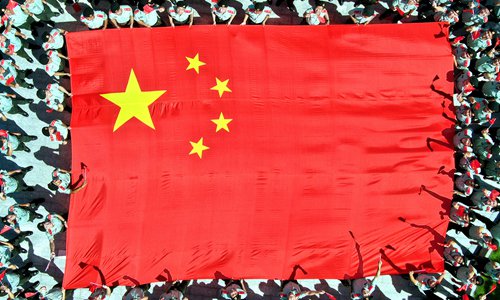HOME >> OPINION,SPECIAL-COVERAGE
Why China’s politics scores above the West’s
By Fan Peng Source:Global Times Published: 2019/9/24 20:58:40

A group of cops in Shenzhen, Southeast China's Guangdong Province, pose for a photo with the Chinese national flag on Friday. Photo: IC
Since the founding of the People's Republic of China in 1949, the country has gained considerable historical experience in the political domain. China's politics and development have always been closely linked. Both the central task of China's political system and the main direction of its political power have always revolved around concerns of its people.In sharp contrast, in some developed countries in the West, political power is divorced from national development goals, and political elites drift away from the people. Western political systems, on many occasions, don't focus on problems, but are guided by electoral politics and ideology.
China's experience is worthy of our confidence in the country's system, and lessons from the West need to be taken as a warning.
First, Western liberal democracy is an incentive mechanism based on distribution, instead of production. People concentrate on how to enjoy vested interests by obtaining political power rather than how to boost production.
Many countries and regions undertake political reforms. People's political rights are seemingly maintained, but in fact, their economic, social and development rights are squelched in a broader way, further leading to an idle political system. This involves a high cost and could undermine social consensus.
China's politics, however, has adopted a mechanism with relatively concentrated political power. It avoids distribution incentives in the political field, which is conducive to improving social production in a stable political environment.
Second, the West has been deeply influenced by the Left. Left-wing politics, which flaunted progressivism in the early days, has been distorted after nearly a century's development. In the early 20th century, the US devoted particular attention to combining efforts of upper and lower classes to solve social problems. But after the 1960s, such a mind-set turned sour. Now, politicians are keen on putting up a show, but no one has solved problems.
Greta Thunberg, a Swedish girl who found favor with Western social media, has called on all teenagers worldwide to skip classes every Friday in an attempt to call for actions on climate change. She was even nominated for the Nobel Peace Prize.
Being sponsored, Thunberg made it to New York City after her 15-day carbon-free voyage by yacht from Plymouth, England, thus becoming an icon in environmental protection in the West. But can China's efforts at environmental protection count on this? In fact in China, we see numerous ordinary workers who are contributing to protecting environment rather than political stars and iconic figures hyped up in social media.
China's reform is like the Great Wall, built brick by brick. In the West, putting up a show can yield benefits rather than solving problems. But in China, we appreciate endless and pragmatic efforts.
Third, in Western countries, many practical problems have been transformed into ideological debates, which have consumed much energy. Introducing moral arguments in policymaking has had a negative impact on reforms and resolving problems. Medical reform and gun control can be examples.
Former US president Barack Obama's medical reform was aimed at a social problem concerning 30 million Americans without any medical insurance. But detractors insisted on making it into an ideological debate. They focused on whether the reform was unconstitutional and whether it violated people's choice. But in China, one of the criteria for evaluating officials is to review their performance. An official who is in charge of a place must provide figures to show the achievements of his/her work.
In Western political system, politicians often seem to be in touch with people from diverse fields. But they only hear voices supporting their views.
In China, high-level officials conduct extensive research in various fields every year. These investigations and the experiences they accumulate constitute the basis for major decisions, which will not be arbitrarily changed due to temporary social trends. In particular, after the reform and opening-up, China's development has not been consumed and delayed by endless ideological debates.
The author is a research fellow at the Chinese Academy of Social Sciences' Institute of Political Sciences. opinion@globaltimes.com.cn
Posted in: VIEWPOINT,MORE 1